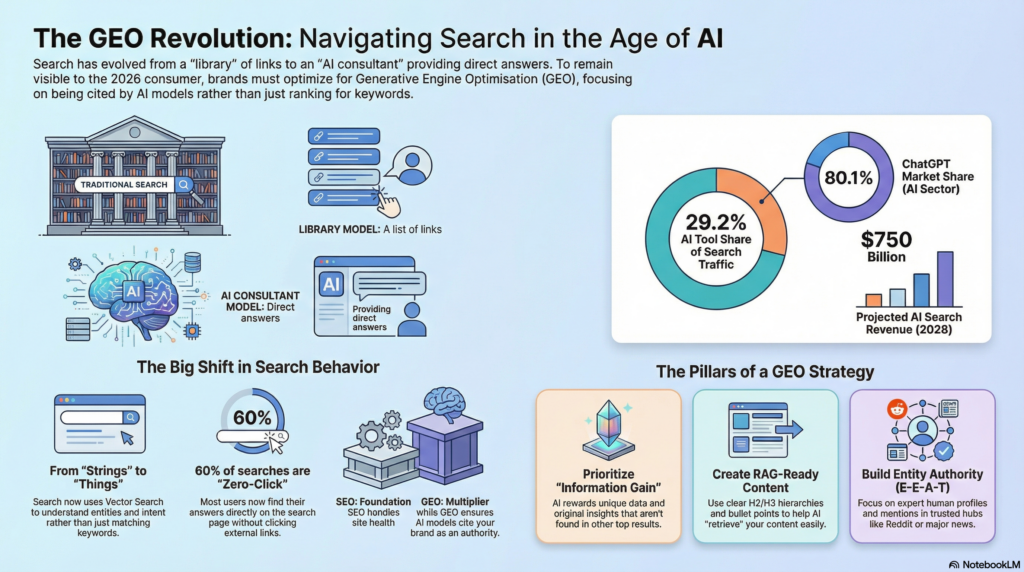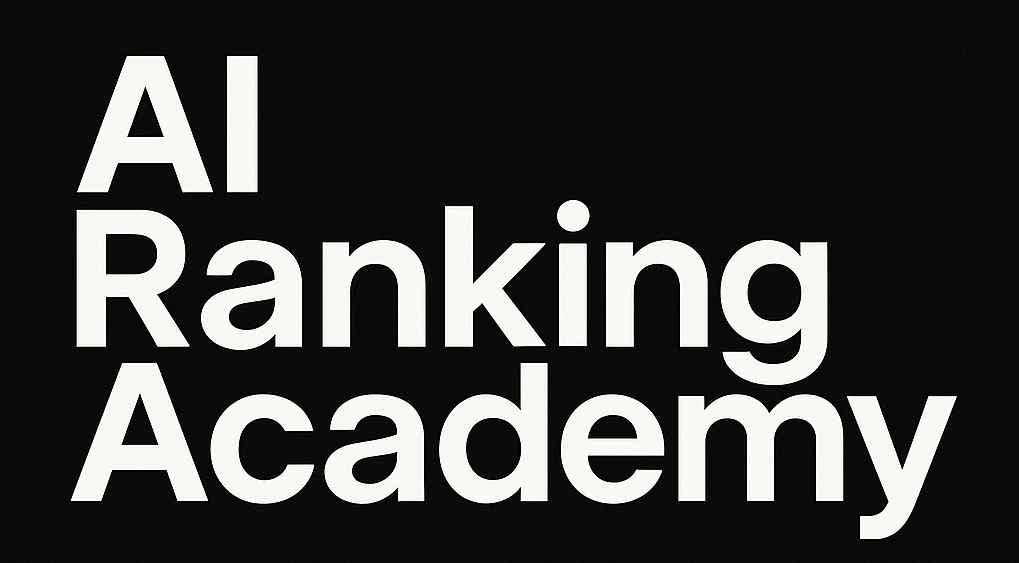TL;DR Summary
Search has changed permanently. AI engines like ChatGPT, Perplexity, and Google’s AI Overviews (AIO) now dominate how users find information.
If your content isn’t visible to these models, your brand is effectively invisible to the 2026 consumer.
The Big Shift: We have moved from “strings” (matching words) to “things” (understanding entities via Vector Search).
The Numbers: Over 60% of searches now end in zero clicks. AI tool usage has surged to 29.2% of all general search traffic.
The Strategy: Traditional SEO is now the foundation, while Generative Engine Optimisation (GEO) is the multiplier.
What Matters: To rank now, you need Information Gain (unique value), RAG-ready content, and a rock-solid reputation in the Knowledge Graph.
Bottom Line: You are no longer competing for a blue link; you are competing for a citation.
Why has search behaviour shifted so drastically?
Search has moved from a “library” model (finding documents) to a “consultant” model (providing answers).
Between January and June 2025, Google’s share of general searches fell from 73% to 66.9%, while daily AI tool usage doubled.
From Keywords to Natural Conversations
Users no longer type fragmented keywords. They speak to search engines as they do to people. This shift toward Natural Language Processing (NLP) means that queries are becoming longer and more contextual.
For example, instead of “anti-frizz tips”, a user asks: “What is the best way to reduce frizz in a tropical climate for curly hair?”
Research shows that queries with eight or more words are seven times more likely to trigger an AI Overview. This is because Vector Search allows AI to understand the “mathematical proximity” of your content’s meaning to the user’s specific intent.
The Rise of Multi-Platform Discovery
Search is no longer a Google monopoly. ChatGPT leads the AI search market with an 80.1% share and an average session time of 14 minutes. Simultaneously, 45% of Gen Z now use TikTok and Instagram as their primary discovery tools. They aren’t looking for a list of links; they want “proof of life”—video evidence and real-world results that satisfy their need for authenticity.
Are “Zero-Click” searches the end of organic traffic?
No, but they have rewritten the rules of engagement. In 2026, roughly 60% of searches result in no external click, rising to 77% on mobile. When an AI Overview appears, even the top organic result can lose up to 45% of its potential traffic.
How to survive in a Zero-Click landscape
To maintain visibility, brands must pivot to “Brand Impression” marketing. If the user gets their answer on the search page, you want your brand to be the one providing it.
- RAG-Ready Formatting: AI uses Retrieval-Augmented Generation (RAG) to “read” your site. Clear hierarchies (H2s and H3s) and bullet points make it easier for AI to “retrieve” your brand as the expert source.
- Information Gain: This is a critical NLP concept. Google rewards content that adds new information to the conversation. If your article is just a rewrite of the top 3 results, your “Information Gain” score is zero, and you won’t be cited.
- TL;DR Summaries: Placing a concise summary at the top of your page can improve on-page conversions by up to 33% and serves as a perfect “snippet” for AI models to ingest.

What is Generative Engine Optimisation (GEO)?
GEO is the process of making your content digestible for Large Language Models (LLMs) like Gemini, Claude, and ChatGPT. It ensures your brand is accurately represented in AI-generated responses. Studies show that GEO-optimised content can boost AI visibility by up to 40%.
The Pillars of a GEO Strategy
- Entity Clarity: You must be a recognised “thing” in the Knowledge Graph. This means your brand, your authors, and your products must be clearly defined across the web (social media, Wikipedia, industry directories).
- Authoritative Citations: AI models prioritise content backed by credible data. Including expert quotes and original statistics increases your citation frequency in AI responses.
- Conversational Depth: Structure your content to answer the “How” and “Why”, not just the “What”.
Why does “Brand Authority” now outweigh backlinks?
In an era of AI-generated noise, search engines rely on Trust and Entity Authority. Google’s recent core updates hit niche sites with weak brand presence hard (some losing 91% of traffic), while established brands like Bankrate held steady because of their proven E-E-A-T (Experience, Expertise, Authoritativeness, and Trustworthiness).
Strengthening Your Brand Advantage
- Owned Audiences: Don’t let a single algorithm be your only traffic source. Build email lists and direct communities.
- Expert Profiles: Promote your authors. AI engines look for verified humans with a history of expertise in their field.
- Consistent Mentions: Earn mentions on the domains AI engines already trust, such as major news outlets, Reddit, and industry-specific hubs.
Strategic Adaptation for 2026 and Beyond
By 2028, over $750 billion in revenue will flow through AI-powered search. Yet, currently, only 16% of companies track AI visibility metrics.
To stay ahead, you must:
- Audit your current GEO performance.
- Assign ownership for AI search visibility.
- Track “Share of Model” (how often is your brand mentioned by ChatGPT compared to your competitors?)
Search behaviour Frequently Asked Questions
What is the main difference between SEO and GEO?
Traditional SEO focuses on keyword rankings and technical site health for crawlers. GEO (Generative Engine Optimisation) focuses on making your content “ingestible” for AI models so they cite your brand as the definitive answer in conversational results.
How much traffic is lost to zero-click searches?
Around 60% of Google searches end without a click. Optimising for snippets, schema, and AI citations can recover visibility.
How do I optimise for AI Overviews (AIO)?
Focus on Information Gain. Provide unique data, expert opinions, or a perspective that doesn’t exist elsewhere. Use clear, structured formatting (lists and headers) and include a “Quick Answer” at the top of your sections.
Is ChatGPT a search engine?
For 12.5% of the population, yes. It has replaced traditional search for complex research and comparison tasks. Its 80.1% market share in the AI sector makes it a critical platform for brand discovery.
What is Retrieval-Augmented Generation (RAG)?
RAG is the process AI models use to look up external information (like your website) to provide an accurate answer. You can optimise for RAG by using structured data and clear, factual language.
Does Google penalise AI content?
No. Google values helpfulness and expertise, regardless of whether the text was drafted by a human or an AI. However, AI content that lacks human oversight, fact-checking, or original insight rarely performs well in the long term.
Should I still focus on traditional SEO?
Yes. Traditional SEO provides the foundation that AI systems draw from. Combine SEO fundamentals with GEO strategy for best results.
What share of traffic now comes from AI platforms?
By mid-2025, AI tools captured nearly 30% of all general searches, with ChatGPT leading the field and Google’s dominance continuing to fall.

Alex King is an AI SEO strategist at AI Ranking Academy, specialising in AI-driven search optimisation, scalable content systems, and modern ranking strategies.

